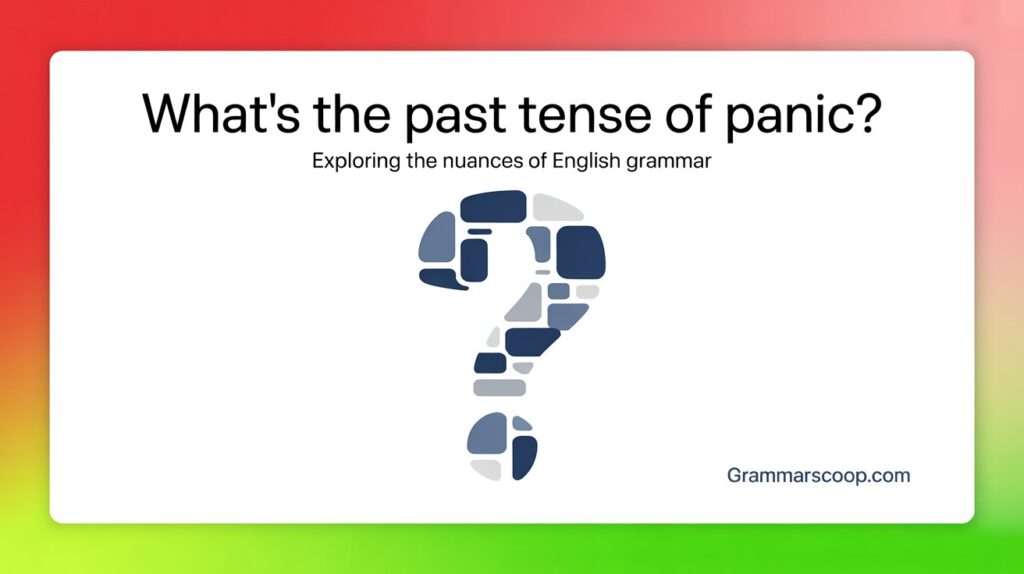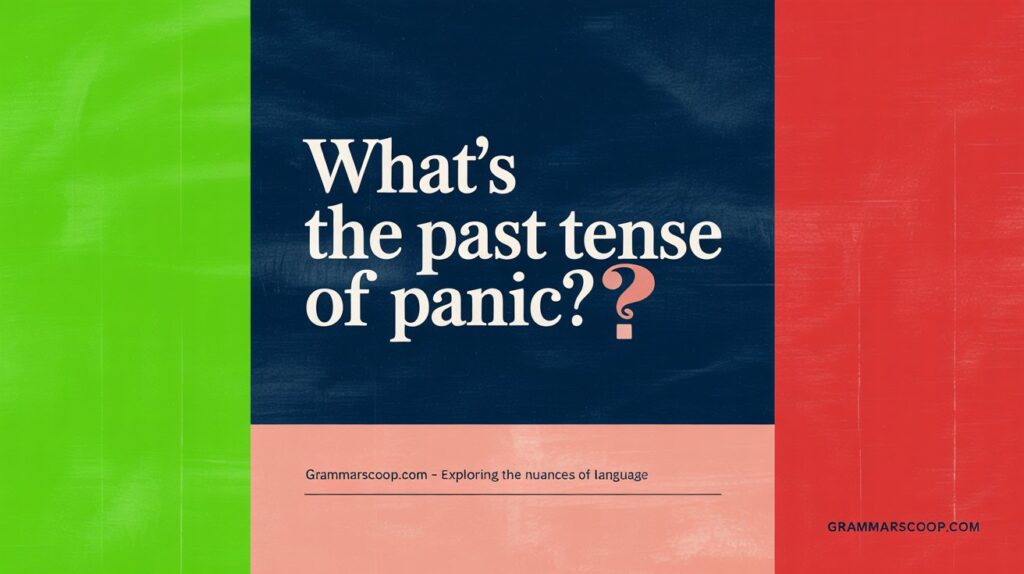Have you ever paused mid-sentence, unsure whether to say “I panic” or “I panicked”? You’re not alone. The past tense of panic trips up even seasoned writers and speakers. It’s one of those irregular-feeling verbs that follows regular rules but throws a spelling curveball. Let’s unpack what makes this verb tricky and how to master it with confidence.
Quick Answer & Key Takeaways

If you’re here for the fast facts:
- The past tense of panic is panicked.
- You spell panicked with a “k” before adding “ed”.
- Panic is a regular verb, but due to its “-ic” ending, it adds “k” before tense endings.
- Common error: paniced or panicced — both are incorrect.
Quick Use Example:
Yesterday, I panicked when I couldn’t find my wallet.
What “Panic” Means & How It Functions
To understand the past tense panic forms better, let’s first explore what “panic” means and how it behaves across parts of speech.
“Panic” as a Noun
When used as a noun, panic refers to sudden, overwhelming fear.
Example:
A wave of panic spread through the crowd.
Synonyms: anxiety, dread, terror, alarm.
“Panic” as an Adjective
Panic can modify nouns to describe a fearful reaction.
Example:
She had a panic response during the fire drill.
It’s often used in compound forms like:
- panic attack
- panic button
- panic mode
“Panic” as a Verb
This is where our focus lies. As a verb, panic means to become suddenly afraid or anxious.
Example (present):
They panic every time the lights flicker.
Example (past):
I panicked when I heard a strange noise.
We’ll dissect how this form is built in the next section.
Why “Panic” Becomes “Panicked”: Spelling & Grammar Rules

Understanding why panic turns into panicked requires just a little grammar know-how.
From “-ic” to “-icked”: The Rule
Verbs ending in -ic (like mimic, traffic, and panic) follow this pattern:
- Add k before “-ed” or “-ing”
- This avoids awkward endings like paniced or panicing
Why add “k”? The English language avoids placing a soft “c” before “e” or “i” in verbs. Instead, we insert “k” to maintain correct pronunciation.
Correct:
- Panicked
- Panicking
Incorrect:
- Paniced
- Panicing
Is “Panic” a Regular Verb?
Yes. Despite the spelling twist, panic is a regular verb. It follows the standard formula:
Base verb + -ed = past tense
It just has a spelling adjustment. So, when someone asks about the past tense of panic, you can confidently say it’s panicked — not panic.
Explore further:
- Hyperbole Vs Metaphor: Definition, Examples & Key Differences
- Up to Date or Up-to-Date: Which One Should You Use?
- Arised or Arose: to the Correct Past Tense of Arise
- Acclimate vs. Acclimatize vs. Acclimatise: Guide to Proper Usage
- Quit vs Resign: Clear Up the Confusion Once and For All
Full Verb Conjugation Table for “Panic”
Here’s how panic plays out across the major verb tenses:
| Tense | Simple | Continuous | Perfect | Perfect Continuous |
|---|---|---|---|---|
| Past | I panicked | I was panicking | I had panicked | I had been panicking |
| Present | I panic | I am panicking | I have panicked | I have been panicking |
| Future | I will panic | I will be panicking | I will have panicked | I will have been panicking |
Useful Tip:
The past participle is also panicked.
Pronunciation Guide: “Panic” vs. “Panicked”
Pronunciation matters, especially in spoken communication.
| Word | IPA | Phonetic Spelling |
|---|---|---|
| Panic | /ˈpæn.ɪk/ | PAN-ik |
| Panicked | /ˈpæn.ɪkt/ | PAN-ikt |
Key Differences:
- Both are stressed on the first syllable.
- Panicked adds a soft “t” sound at the end.
Audio Memory Trick: Think of panicked rhyming with franticed (if that were a word).
Real-World Usage Examples
Let’s break it down into the present and past.
Sentences Using “Panic”
- Every time the boss calls a meeting, I panic.
- Kids panic during surprise fire drills.
- Don’t panic—it’s just thunder.
Sentences Using “Panicked”
- I panicked when the power went out.
- They panicked after seeing smoke.
- She panicked during her first interview.
These real-life examples demonstrate when and how to apply the past tense panic form.
Common Errors to Avoid
Here’s what to never write or say:
- “He panic yesterday.”
- “I panicced when I lost my phone.”
- “They paniced during the test.”
Synonyms & Near Synonyms of “Panic”
Need to switch it up in writing or conversation? Here are alternatives:
As a Verb (i.e., instead of “I panicked”)
- I freaked out
- I froze
- I lost it
- I flipped
- I got alarmed
As a Noun
- Terror
- Fear
- Dread
- Alarm
- Distress
Example Rephrasing:
Instead of “I panicked,” try “I freaked out when I saw the report was missing.”
Related Expressions & Idioms with “Panic”
You’ll often hear panic used in everyday idioms.
- Don’t panic! — made famous by The Hitchhiker’s Guide to the Galaxy.
- Hit the panic button — to overreact suddenly.
- Panic mode — a state of intense worry.
- Panic buying — hoarding items due to fear (e.g., during a lockdown).
These idioms use panic in flexible, expressive ways that are especially common in media and casual speech.
FAQ: Quick Grammar Doubts
- Is “panic” ever correct as a past tense?
No. Panic is the base form. Only panicked works as the past tense of panic.
- Why is it spelled “panicked” with a “k”?
Because English adds k after verbs ending in -ic to preserve pronunciation. The rule keeps it clear and consistent.
- Do British and American English differ here?
Not in this case. Both varieties use panicked as the correct past tense form.
Case Study: Real-Life Language Confusion
Scenario: A marketing intern submitted a campaign draft reading:
“Our team panic when the server crashed.”
What Happened: The manager flagged the grammar and requested a rewrite. The correct version:
“Our team panicked when the server crashed.”
This is a classic case of a grammar slip that changed how professional the writing sounded.
Key Takeaways Recap
Let’s summarize the essentials one last time:
- The past tense of panic is panicked.
- You must add a “k” before “ed” or “ing”.
- It’s a regular verb with a spelling tweak.
- Panic = present | Panicked = past | Panicking = progressive
- Common errors: paniced, panicced, panic as past tense
- Both US and UK English follow the same rule
Conclusion
When stress levels rise, your grammar doesn’t have to. The next time you’re telling a story and wonder, “Is it panic or panicked?” — you’ll know the answer. Say it with confidence: “I panicked.” Just remember the “k,” follow the regular verb pattern, and you’ll never second-guess the past tense of panic again.
And hey, don’t panic about your grammar. That’s what this guide is here for.
Liked this post? Bookmark it or share it with someone who always panics over grammar.

Lisa Morris is a seasoned blogger and language enthusiast with a passion for making grammar simple and engaging. At Grammar Scoop, she shares clear, concise tips that help readers master the rules of English with confidence.






